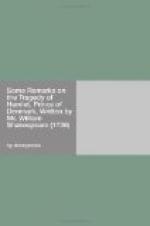Page 227.
Marcell. HORATIO says ’tis
but our Phantasie,
And will not let Belief take hold
of Him,
Touching this dreaded Sight twice
seen of Us;
Therefore I have intreated him along
With us to watch the Minutes of
this Night;
That if again this Apparition come,
He may approve our Eyes, and speak
to it.
HORATIO, Tush, Tush, ’twill not appear!
These Speeches help greatly to deceive us; for they shew one of the principal Persons of the Drama to be as incredulous, in Relation to the Appearance of Phantoms, as we can be; but that he is at last convinc’d of his Error by the Help of his Eyes. For it is a Maxim entirely agreeable to Truth, if we consider human Nature, that whatever is supernatural or improbable, is much more likely to gain Credit with us, if it be introduced as such, and talk’d of as such by the Persons of the Drama, but at last prov’d to be true, tho’ an extraordinary Thing, than if it were brought in as a Thing highly probable, and no one were made to boggle at the Belief of it. The Reason of this seems to be, that we can for once, upon a very great Occasion, allow such an Incident as this to have happen’d, if it be brought in as a Thing of great Rarity; but we can by no means so suspend our Judgement and Knowledge, or deceive Our Understandings, as to grant That to be common and usual which we know to be entirely Supernatural and Improbable.
Page 227.
Enter the Ghost.
Here it is certain, nothing could be better tim’d than the Entrance of this Spectre; for he comes in and convinces Horatio, to save Marcellos the Trouble of repeating the whole Story, which would have been tiresome to the Spectators, as these Gentlemen were obliged soon after to relate the Whole to Prince Hamlet.
Horatio’s Speeches to the Apparition are exceeding Natural, Aweful, and Great, and well suited to the Occasion and his own Character.
What art Thou, that usurpest this Time of Night, Together with that fair and warlike Form, In which the Majesty of buried Denmark Did some Time march? By Heaven, I charge thee speak. Page 227.
The other is Page 130.
—— Stay Illusion! If thou hast any Sound, or Use of Voice, Speak to me! If there be any good Thing to be done, That may to thee do Ease, and Grace to me, Speak to me. If thou art privy to thy Country’s Fate, Which, happily, Fore-knowing may avoid, Oh Speak! Or if thou hast uphoarded in thy Life Extorted Treasure in the Womb of Earth, For which, they say, you Spirits oft’ walk in Death, Speak of it,—Stay and speak!—Stop it Marcellus.
His desiring Marcellus to stop it, is also much in Nature, because it shews a Perturbation of Mind, very much to be expected at such an Incident. For he must know, being a Scholar, (as they term him) that Spirits could not be stopp’d as Corporeal Substances can.




